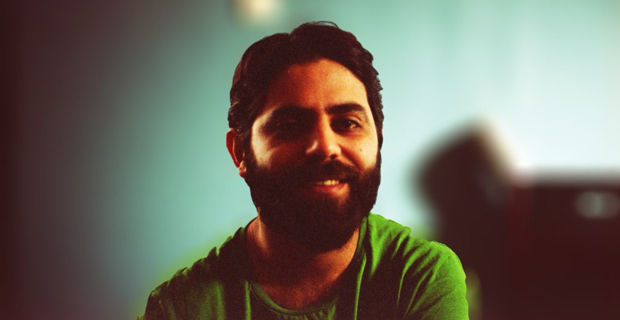
Born in 1981 in Kermanshah and brought up in Tehran, Mehdi Navid is a writer, translator and editor best known for his translations of Beckett and Brautigan. Determined to embark on a literary career at an early age, “I attended Houshang Golshiri’s literary criticism and book review courses at the newly-founded Karnameh Magazine,” says Navid; “I was sixteen or seventeen and there I decided that literature would be my only profession.” He has been working as editor and book evaluator of the well-known Iranian publishing house, Nashr-e Ney. His debut translation, Edward Albee’s Sandbox was published in Karnameh in 2000 and since then he has had many more pieces of his poetry and translations published in various magazines and periodicals. His debut novel, The Book of Sounds, was released rather independently in 2012 in Persian and English. In 2004, a selection of his poems appeared in volume 11 of Other Voices Poetry. At the moment, Navid is busy editing a series of critical articles on eminent contemporary Iranian writers, the first of which is the upcoming volume Bahram Sadeqi; a good occasion to inquire about his favorite and recommended works of contemporary literature.
.
PARSAGON: What are the top seven works of world literature that have had the deepest influence on your life and career?
- The Trilogy of Samuel Beckett
- Sunstone by Octavio Paz
- Sixty Stories & Forty Stories by Donald Barthelme
- Howl by Allen Ginsberg
- The Complete Short Stories of Anton Chekhov
- Lolita by Vladimir Nabokov
- In Praise of the Stepmother by Mario Vargas Llosa
PARSAGON: What are the top seven Iranian works that deserve global attention or have been neglected by world readers and translators?
NAVID:
- Fear and Trembling, by Gholamhossein Sa’edi
- Five Treasures, by Houshang Golshiri
- Scorpion on Andimeshk Railway Stairs, or This Train is Bleeding, Sir! by Hossein Morteza’eian Abkenar
- Ismail by Reza Baraheni
- Funeral Prayer by Reza Daneshvar
- Scattered poems, especially of Bijan Elahi
- The Tide and The Fog by Ebrahim Golestan
